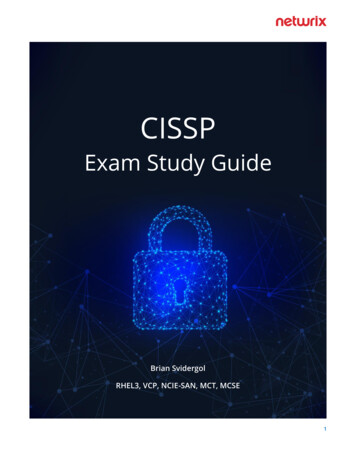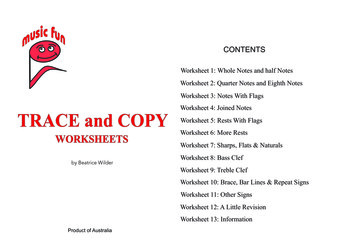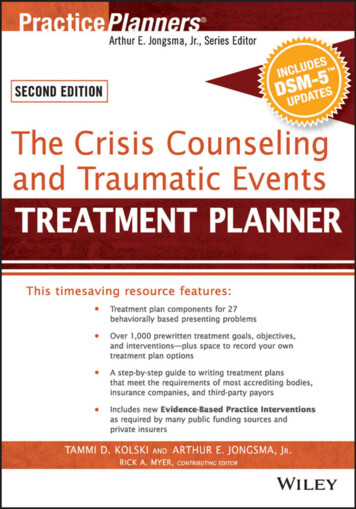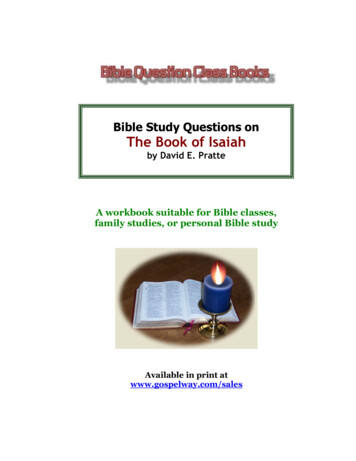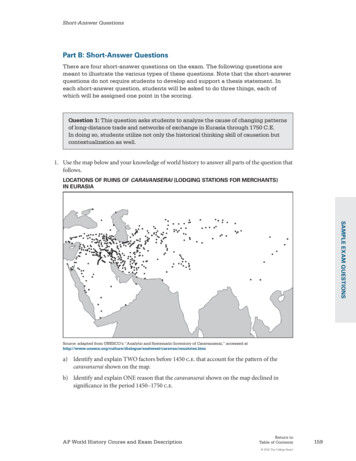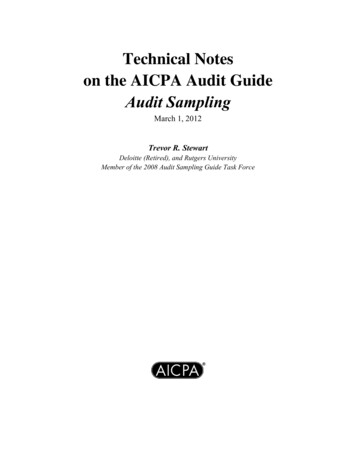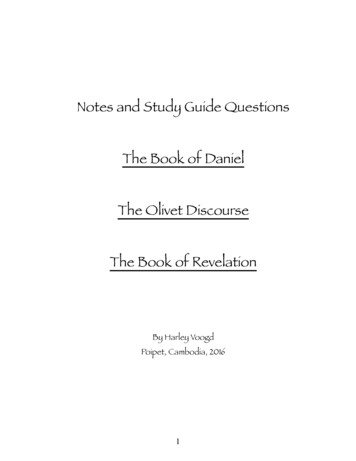
Transcription
Notes and Study Guide QuestionsThe Book of DanielThe Olivet DiscourseThe Book of RevelationBy Harley VoogdPoipet, Cambodia, 20161
ContentsThe Book of DanielThe Olivet DiscourseThe Book of Revelation .3 20 242
Notes on the Book of DanielDaniel was brought over to Babylon when Nebuchadnezzar was the king in 605 BC. Daniel livedthroughout the span of the Babylonian empire and into the time of the Persian empire. He prophesiedmuch about the future of Babylon, Persia, Greece, the Roman empire, and even Jesus. Daniel’s prophesiesprobably go no further than AD 70, when the second temple was destroyed by the Romans.Chapter One!Nebuchadnezzar took control of Judah by God’s authority (vs. 2), not by his own.Nebuchadnezzar was a powerful king, but he needed reminding that he only had his powerbecause God allowed it. Nebuchadnezzar was often tempted to steal God’s glory.!Nebuchadnezzar raided the temple, but he did not destroy it yet. The destruction of the templecame about 20 years later (see Jeremiah 52).!Daniel, like Joseph, refused to "prostitute" himself with Babylon (vs. 8). Daniel is a new Joseph —a true witness to the Gentile world.!Vs. 5 — Nebuchadnezzar wanted the young men to be trained in his wisdom, but they refused.Because Daniel and his friends remained faithful to God, they received God’s wisdom — see vs.17.!Vs. 8 — Daniel refused to eat of the king’s delicacies - see Ps. 141:4!Vs. 1 to vs. 21 — Nebuchadnezzar to Cyrus Daniel’s entire time in captivity (about 70 years).Daniel stayed faithful for the entire time. Will you stay faithful in your time?3
Chapter Two!Nebuchadnezzar had his disturbing dreams. He called in all of his wise men. They spoke to himin Aramaic (a Gentile common language at the time). From Daniel 2:4 to the end of chapter 7 thebook is written in Aramaic, while the other sections are in Hebrew. Why is 2:4 7:28 in Aramaic?Possibly because that section has to do with the Gentile nations, while the other sections have todo with the Jewish people.!Nebuchadnezzar asked the impossible (vs. 5-6), and when his wise men can not fulfill therequest, he orders for all of them to be killed, including Daniel.!Vs. 14 — Arioch had the same position as Potiphar — see Gen. 39:1. Daniel Joseph!The vision came to Nebuchadnezzar in the night, as well as to Daniel — the angel of death camein the night in Egypt — this is like another passover.Things are settled at midnight. Night begins to turn to day at midnight — from death to new life." Lot and his family left Sodom during the night, and as day broke, Sodom was destroyed butthey were saved. The Israelites left Egypt as the day broke after the Passover night, while theEgyptians mourned the destruction of their future (their sons). At midnight Boaz awoke to Ruth(Ruth 3:8). At midnight King Ahasuerus decided to honour the Jews (Esther 6). At midnight Godrestored Israel in the person of Joshua the High Priest (Zechariah 3, at the center of the nightvisions of Zechariah 1-6) in Daniel 7 the Ancient of Days takes His seat at midnight and historychanges. In Matthew 25:6, the bridegroom arrives at midnight. At midnight an earthquake shookthe Philippian jailer to his senses (Acts 16:25). At midnight Paul raised a fallen son to life againand served the Christian passover meal (Acts 20:7-12). At midnight Paul challenged the Romansto abandon the ship of Rome and put their trust in Jesus, and served them bread (Acts 27:27-44)."1##!#The vision:A great image — Head of gold: BabylonChest and arms of silver: Media/PersiaBelly and thighs of bronze: GreeceLegs of iron and feet and iron and clay mixed: Rome!Vs. 34 — a stone was cut out with our hands — an altar (see Ex. 20:25) — cut from a mountain(vs. 45) — Jesus was begotten of God — the stone smashes the image and grows to fill the wholeearth — Christ’s kingdom.!When the stone strikes the image, the image is destroyed in reverse order (vs. 34-35), but thewhole image is destroyed at once. The empires of the image were layered into one: the Romanempire (just as the four beasts in Daniel 7 are layered into one in Revelation 13:1-2).!Gold to Silver to Bronze to Iron (Heaven to earth) — the empire increases in power but decreasesin Godliness. (2 Chron. 12:9-10 — Solomon’s gold is replaced with bronze — less Godly).Chapter Three!Nebuchadnezzar sets up an image of gold — probably because of the vision — he has becomeproud and is stealing from the Father.4
!Nebuchadnezzar set up a false temple complex: the image ladder to heaven; the fiery furnace altar; the instruments the Levitical orchestra; satraps, administrators, governors, counsellors Levites (see 1 Chron. 9:26; 23:4ff.) A false temple is set up by the Jews in Zech. 5:5-11 as well, butwhere as Nebuchadnezzar was wise enough to shut down his false temple, the unbelieving Jewswere not (see Revelation 17 — the woman in Zech. 5 and the woman in Rev. 17 are the same).!Vs. 5-7 — the repetition of all the musical instruments is comical and is mocking pagan worship.!Nebuchadnezzar was furious that Shadrach, Meshach, and Abed-Nego would not worship theimage. Vs. 19 — full of fury, Nebuchadnezzar ordered the flame to be made seven times hotter —he was building up his own fury — but his own fury only served to kill his own men (vs. 22) —God’s fire saves, like the burning bush (vs. 25).!Afterwards, the three men came out unharmed — their garments were not affected (vs. 27), theystill held office — the smell of fire was not on them, no smell (sweet odour) of the sacrifice (seeLev. 1-7).!Vs. 25 — "the Son of God" God’s anointed ruler (see Ps. 2:7-12).Chapter Four!Vs. 4 — Nebuchadnezzar is flourishing — like a tree (HB. ra’ãnan: green). Nebuchadnezzar sees atree in his vision (vs. 10) — the kingly tree the Tree of the Knowledge of Good and Evil (see 2Sam. 14:17; 1 Kings 3:9).!Vs. 12 — the beasts of the field found shade under the tree — compare to Jer. 27:5-6; 28:14 —Nebuchadnezzar is the tree, but only by God’s command.!Nebuchadnezzar again believes he is powerful by his own might — he is stealing from Godagain. He needs to die (vs. 14; compare to Acts 12:20-23). But, will he be resurrected (vs. 15a)? Yes,Nebuchadnezzar is baptized (vs. 15b — dew of heaven - see 1 Peter 3:20-21). But first he must bejudged (vs. 16 — he becomes a beast, like Adam clothed as a beast). Then he rises again withunderstanding (vs. 34) and a new heart (Daniel 7:4). Also compare vs. 33 (eagle’s feathers) toDaniel 7:4.!Nebuchadnezzar is fully resurrected (vs. 36) and is converted to the worship of Daniel’s God. Vs.36 is Nebuchadnezzar’s last words in the Bible; don’t be surprised if you meet him in Heaven.Chapter Five!Belshazzar was probably Nebuchadnezzar’s grandson (see Jer. 27:6-7).!The feast being held was not some drunken orgy; it was probably a very somber event.Belshazzar knew that Darius the Mede was coming (vs. 30). Belshazzar probably brought out allthe gods so that hopefully one of them could help him. One God did speak to Belshazzar, but itwas not a good message.!The lampstand was was brought out — the lampstand in the temple was always lit and it satopposite the table of showbread — the table of showbread represented Israel — God was always5
watching Israel.!The lampstand at the feast was probably lit and it shone onto the wall where God wrote thewords (vs. 5).!Vs. 5 — a hand appeared (vs. 23: this hand holds Belshazzar’s breath) — compare to ch. 4:35 —"No one can restrain His hand "!Vs. 6 — when the king saw the hand, "his countenance changed (his head — head of gold), histhoughts troubled him (his heart — chest/arms of silver), the joints of his hips were loosened(belly/thighs of bronze), and his knees knocked together (his legs — legs of iron)"!Vs. 6 — "the joints if his hips were loosened" — he soiled himself — compare to Isaiah 45:1 —Cyrus loosened Belshazzar’s belt (see note on vs. 31)!Vs. 10 — the queen: probably Belshazzar’s mother and Nebuchadnezzar’s daughter as allBelshazzar’s wives were already at the feast (vs. 2b) — she remembers her father’s conversionand remembers Daniel. Daniel is being contrasted to Belshazzar here — Daniel (Belteshazzar) is afaithful son while Belshazzar is not.!Vs. 12 — "explaining enigmas" or "solve difficult problems" (NIV) — HB. literally says "tounravel" or untie knots — this writing on the wall would untie Belshazzar for good (vs. 6), also invs. 16!Vs. 13 — "Are you that Daniel who is one of the captives of Judah, whom my father the kingbrought from Judah?" — this was an insult to Daniel as Daniel was a powerful man in the empire.!Belshazzar, despite knowing what happened to Nebuchadnezzar, still was proud before God, andworshipped the "gods of the image" (vs. 23b — "silver and gold, bronze and iron, wood andstone")!The riddle could not be understood — God was "speaking in tongues" (see Isaiah 28:11-12 and 1Cor. 14:20-22) — Babel!The riddle: "Mene, Mene, Tekel, Upharsin" — Reckoned, Reckoned, Weighed, and Assessed —Belshazzar was weighed and found to be too light. Belshazzar does appear to repent (vs. 29), hedoes not reject Daniel’s words.!Vs. 31 — Who was Darius the Mede? Media was an empire east of Babylon, and was initially agreater empire than Persia. Persia joined with Media, and over time Persia became moredominant. So, there were Median kings who came to power over the Persian empire. "Darius"was probably not a proper name, but rather was a title for a Median king. It is probable thatDarius was Cyrus, Cyrus being his Persian name.For example — In Gen. 20:3 we read of Abimelech. Abimelech was not a proper name but rather atitle — see introductory note on Psalm 34 and compare to 1 Sam. 21:10-15. "Pharaoh" was also atitle, not a proper name.Daniel 6:28 in the Hebrew could also read: "So this Daniel prospered in the reign of Darius, that is,the reign of Cyrus the Persian."If this is true then Darius the Mede is the same Cyrus who allowed the Jewish people to rebuild###6
#Jerusalem and the temple.It would appear that Daniel knew Darius the Mede for some time even before Darius took overBabylon. Daniel was immediately given power over of the kingdom (if Darius didn’t knowDaniel he probably would have killed him along side Belshazzar). Also, Darius grieved muchwhen Daniel was thrown into the lion’s den (an event which happened only a few weeks afterDarius took power). Daniel 5:31 is actually 6:1 in the Hebrew text implying that Daniel was put inpower by Darius immediately after Darius took power.Chapter Six!This story can obviously be compared to the death and resurrection of Jesus. We can alsocompare Darius to Pilate — Darius knew that Daniel was innocent and tried to save him (vs. 14)— Pilate did the same for Jesus (John 18:38-39; 19:12-15) — Darius grieved and fasted for Danieland, in the morning, rushed to the lion’s den to see if Daniel’s God had saved him (vs. 18-20) —Pilate washed his hands of the matter (Matthew 27:24).!Darius believed God would save Daniel — Nebuchadnezzar did not (Daniel 3:15b).Chapter Seven!Vs. 2-4 — the saints (four winds) burst upon the nations (1 Kings 19:15 - Elijah given authority toanoint Gentile kings, and the exile) — the Beasts are called up to be a protecting "ark" for God’speople (Jonah — Jonah went out on a boat into the "Gentile sea" to convert Nineveh, the capitalcity of Assyria, 70 years before Assyria took northern Israel into captivity. Babylon took overAssyria and took Judah into a captivity. Israel remained in exile until the time of Rome, whenJesus, the true Israel, came and freed the covenant people [see Chapter 3, "Eschatology of Israel"].The "ark" [Assyria, Babylon, Persia, Greece, Rome] begun with Jonah sank in Acts 27.)!Vs. 4-5 — Nebuchadnezzar is converted — Persians take over!Vs. 6 — Third beast Greece — Four Heads 1) Alexander; 2) Greek Syria (King of the North Daniel 11); 3) Greek Egypt (King of the South); 4) Hellenistic/Republic Rome — Jews scatteredthroughout the empire on the wings of Greek culture (Zech. 2:1-6)!Vs. 7-8 — Imperial Rome rises — still maintains much of Greek culture (language, gods) — Rev.13:2a — little horn rises (Herod and the wicked Jews) — they take over Israel!Vs. 9-10 — Ancient of Days (Jesus? Or the Father?) — if Jesus, then this is His ascension to thethrone — "garment was as white as snow" priestly garment — "hair of His head was like purewool" - compare to Rev. 1:14 — vs. 9b compare to Ezekiel 1:16 — vs. 10b - the books - compare toRev. 5-7!Vs. 11-12 — Jewish powers oppose Jesus and His people — Jewish beast (the little horn controlsthe beast in its relation to God) slain and body destroyed in fire - see Lev. 21:9 - beast is a feminineword in the HB. (AD 70) — Gentile beast loses its rule (AD 70 - Jesus now rules - vs. 14a) but isallowed to continue until God’s purpose is done for them (fall of Roman empire?)!Vs. 13-14 — The Saints ("One like the Son of Man" - Jesus? Or the Saints? - Ezekiel was called the7
Son of Man ninety-one times) — receive the kingdom (see vs. 18, 22, 25-27) — the thrones (vs 9;Rev. 4:4) are vacated by angels (Rev. 5-19) and are taken by the Saints — vs. 13a - coming on theclouds of heaven, not from heaven to earth, but from earth to heaven - like an ascension offering(Lev.16) - quoted by Jesus in Matthew 26:64 — vs. 14b compare to Daniel 4:3, 34!Vs. 15 — Daniel is troubled as he now knows his own people will stand against God’s kingdom!Vs. 16-18 — Angel summarizes the vision!Vs. 19-22 — Roman beast devouring and destroying — Jewish power persecuting the Saints!Vs. 23-24 — the Roman beast will be different - it will rule in an absolute way!Vs. 24-25 — the Jewish power will rise and try to change the decree that God’s people will rule(God decreed that the Saints would rule - vs. 22) — he will have power for a time (time of Jesus),times (apostolic age), and half a time (the great tribulation from Pentecost to about AD 67 - Matt.24:21-22)!Vs. 26 — AD 67 - AD 70!Vs. 27-28 — The Saints will rule with Jesus foreverChapter Eight!The script is now back to Hebrew!Vs. 1 — the third year - third time of judgement!Vs. 3-5 — these animals are not "beasts" but rather cattle, domesticated animals - clean animals sacrificial animals (see Ex. 12:5; Lev. 4-5; Num. 28-29) — the animals represent Gentile powers butthe focus is on Israel — the male goat comes from the west - west of what? - west of Israel — theram Media/Persia (vs. 20) — the male goat Greece (vs. 21) — the two horns on the ram, onehigher than the other, and the higher came up last Media was first, but Persia grew morepowerful later — the one horn on the male goat Alexander the Great!Vs. 9 — a little horn a Jewish power — vs. 11 - the daily sacrifices were taken away - only aJewish power could do this - As long as the Jewish people remained faithful to God, God waswith them and protected them from their enemies. If the people were unfaithful, and theyoffended God (an abomination), God would leave the temple (desolate the temple) and hand theJewish people over to their enemies. If a Gentile power ever entered the temple to raid it it wouldonly be because God allowed that to happen.!Vs. 11 — the "daily sacrifices" — actually called the "continual sacrifices" in the Hebrew — thecontinual sacrifices were made each morning and evening at the temple (vs. 14)"What is the theology behind all this imagery? It is this: The calling of Israel was to pray for andbring offerings near to God on behalf of the nations of the world. The ox was particularly for theHigh Priest and for Israel as a whole (Lev. 4). But the daily offerings and the continual annualcycle involved the nations of the world, especially after the establishment of the Oikoumene(Assyria, Babylon, Media/Persia, Greece, Rome empires). The meaning is this: As long as the#8
Jews are faithful and pray for the nations, offering rams and he-goats for the imperial leaders,then they will have good rams and he-goats as emperors. First the ram of Persia would come anddeliver them from Babylon. Then, when the ram had ceased to do God’s bidding, a buck fromGreece would arise and deliver them from Persian oppression (see Zechariah 9:1-8). But after theGreek deliverance, there would come a time when some evil Horn would wreck the Continualofferings. Such an evil horn can only be a Jewish, and indeed priestly person, because no one elsecould wreck the system. Some pagan king putting a temporary halt to the offerings would countfor nothing in God’s eyes. It was only His anointed priests who could defile the worship. In otherwords, the fact that the horn is able to wreck the sanctuary and pervert the Continual makes itclear that he symbolizes, at least in part, a Jewish power."2!Vs. 13 — "How long will the vision be, concerning the daily (continual) sacrifices and thetransgression of desolation (offending God to the point where He abandons the temple), thegiving of both the sanctuary and the host to be trampled underfoot?"!Vs. 14 — "And he said to me, 'For two thousand three hundred days (HB. evenings andmornings): then the sanctuary will be cleansed." — 2300 days just over 6 years — Herod’stemple was complete in AD 64 - there was a lot of Jewish persecution towards the Church at thattime - Nero also began his persecution of Christians that year - approximately 6 years later thetemple was destroyed.!Vs. 15-22 — the vision is explained — after Alexander died his empire was divided!Vs. 23-26 — this is a good description of the Herods — the Herod kings were part Jewish, partEdomite (Esau - brother/brother) who ruled over Israel leading up to and during the time ofChrist.!Vs. 19 — "Latter time" and "end time" — the latter time and end time refer to the last days of theOld Covenant world, not the return of Jesus.!It is good to study the history of the time around Jesus’ first advent. Recommended reading: "AHistory of the Jewish People in the Time of Jesus Christ" by Emil Schürer (see bibliography).Chapter Nine!Vs. 1 — Darius or Cyrus (?) - his first year in power!Vs. 2 — 70 years - see Jer. 25:11ff. Also see Ezra 1:1ff. Why 70 years? - See 2 Chron. 36:20-22; Lev.25:1-7; 26:34ff.!Daniel knows his people should start going home now, but that hasn’t happened yet. He iscompelled to pray on behalf of his people.!Vs. 4 — Daniel "made confession". He wants God to remember His covenant with Israel - see Lev.26:40-42!Vs. 11 - compare to Num. 5:18-249
!Vs. 13-19 — Daniel prays for for forgiveness for the sins of his people and he asked God tovindicate Himself. God can only be vindicated if He returns to dwell in His temple. God has tofind a way to forgive.!#Vs. 24 — The answer to Daniel’s prayer — 70 weeks are determined for your people (the Jewishpeople) — that is, 70 weeks of years, not days - 490 years — 70 sabbatical years and 10 jubilees —"With reference to the seventy years of captivity, as they had been so long kept out of thepossession of their own land, so, being now restored to it they should seven times as long be keptin the possession of it. So much more does God delight in showing mercy than in punishing."3"To finish transgression" — Apostasy/Rebellion — The fullness of sin/apostasy came whenhumanity rejected Jesus - focused in His own people, the Jews."To make an end of sins" — To seal purifications (purification offerings) — Jesus was the finalsacrifice. Jesus sealed, or authenticated, all the previous animal sacrifices."To make reconciliation for iniquity" — To cover — Jesus covered, once and for all, ourpunishment deserved (liability)."To bring in everlasting righteousness" — Christ’s kingdom"To seal up vision and prophesy" — All Old Testament prophecy is about Jesus, and Jesus fulfilledall Old Testament prophesy."And to anoint the Most Holy" — Jesus anointed as the Holy of Holies — Messiah.!####Vs. 25"The command" — Cyrus — Ezra 1:1-4. Also see Isaiah 44:23-28; 45:1-13."Messiah the Prince" — Messiah Anointed One — Prince Commander (HB nâgîyd) — Jesus"There shall be seven weeks" — From Cyrus’s decree till the end of Nehemiah."And sixty-two weeks" — From end of Nehemiah to Jesus.!##Vs. 26"Messiah shall be cut off" — Jesus’ crucifixion and excommunication."And the people of the prince who is to come " — The people the Roman armies? TheChurch? — The prince who is to come or, the coming commander (HB) this is still Jesus." Shall destroy the city and the sanctuary." — Jerusalem and the temple — AD 70 — Jesus’judgement on unbelieving Israel — the vindication of Jesus.######!##Vs. 26a is parallel with 27a, and 26b is parallel with 27b.26a "Messiah shall be cut off" 27a "He shall bring an end to sacrifice and offering."26b "The end shall be with a flood" 27b " poured out on the desolate."!#Vs. 27"Then he (Jesus) shall confirm a covenant " — confirm to be strong (HB gâbar) — a mightycovenant — this is probably the covenant made with Abraham - the covenant made after Babelseparating the Hebrews apart as God’s priestly nation (see Matt. 5:17)." with the many for one week." — The many the Jews — for one week the final week (orfinal 7 years) of the 70 — First 3 ½ years being Jesus’ ministry, after which He is crucified, thesecond 3 ½ years being the time the gospel is preached exclusively in Judea (to the Jew first) bythe apostles ending with the stoning of Stephen (?) after which "a great persecution arose againstthe church which was at Jerusalem; and they were all scattered throughout the regions of Judeaand Samaria, except the apostles." (Acts 8:1)"But in the middle of the week He shall bring an end to sacrifice and offering." — Jesus’ death onthe cross - no longer is there any need for the memorial animal sacrifice - now we have the Lord’s##10
##Supper."And on the wing of abominations " — wing priestly garment (?) (see Num. 15:37-41 — "maketassels or fringes on the corners of your garments" — tassel HB tsîytsith a wing likeprojection).The 490 years, if beginning from Cyrus’s decree and running till the stoning of Stephen, can notbe taken literally. The first seven weeks, or 49 years (vs. 25) and the last week, or 7 years (vs. 27),can be taken literally, but the middle section of 62 weeks, or 434 years, is too short to be takenliterally (the decree of Cyrus was given ca. 537 BC making the 434 years about 83 years too short).There is no reason why we have to take these years literally in prophecy. Perhaps what is beingshown is God’s mercy in the prolonging of the 434 years with an additional 83 years. The 70weeks of years is given in contrast to the 70 years in captivity (see note on vs. 24 above).Greek Empire Around 270 BCChapter Ten!This is the third year of Cyrus — the decree to rebuild Jerusalem and the temple is already overtwo years old.!Vs. 2-3 — Daniel ate no meat or wine - he cut himself off from the bread and wine of God’skingdom — nor did he anoint himself - cut off the anointing of God’s work. Daniel’s fast was11
over the passover time — he was willing to die for his people. Fasting is related to sorrow something is terribly wrong.!Vs. 4 — Daniel is by the Tigris river in the vision — he is not back in the promised land yet —God meets him out here — why? — something has gone wrong — Ezra 4!Vs. 5 — "a certain man" Jesus — compare to Rev. 1:12-15!Vs. 7 — compare to Acts 9:7!Vs. 8-9 — "Therefore I was left alone when I saw this great vision, and no strength remained inme; for my vigour was turned to frailty in me, and I retained no strength." — frailty destruction(HB mashchîyth) or corruption, like in Sheol — Daniel dies — deep sleep near death, like whenAdam was put to sleep when God created Eve (Gen. 2:21). Compare to Dan. 8:18.!Vs. 10-11 — " a hand touched me " — "' stand upright '" — Daniel is resurrected."And he said to me " — he an angel, possibly Gabriel again.!Vs. 13 — "the prince of the kingdom of Persia" — this probably refers to a fallen angel who hadauthority over Persia, where as the "kings of Persia" probably refer to human rulers. The angel(Gabriel?) had to convince the kings of Persia to serve God rather than the Prince of Persia."Michael, one of the chief princes " — Michael is the angel with authority over the Jewishpeople (Daniel 12:1) — Michael and Gabriel are the only angels named in the bible — Michael isthe only angel called an archangel (Jude 1:9) — Some have taught that there were threearchangels: Michael, Gabriel, and Lucifer (who, before the creation of the world, fell and becameSatan). I disagree with that.4 Michael is probably Jesus.#!Vs. 14 — "the latter days" — of the Old Covenant world.!Vs. 20 — "the Prince of Greece" the fallen angelic overlord of Greece.Chapter Eleven!First year of Darius the Mede or Cyrus (?)!Chapters 10-12 are one large prophecy. The prophesy of chapters 10-12 fits Greek/Roman historyso well that liberal scholars (those who disbelieve in the inerrancy of scripture) have used this asa reason to say that Daniel was not the author and these prophesies were written many yearsafter the events had happened. But, we believe that God gave Daniel these visions, and that iswhy they are so accurate.5!Vs. 1 — would make more sense if this verse was actually 10:22 as this is still the angel speaking.!Vs. 2 — "three more kings" for Persia: Cambysus, Smerdis, Darius I6 (not the same man as Dariusthe Mede) — "and a fourth ": Xerses I (?)!Vs. 3 — "a mighty king shall arise" — Alexander the Great.!Vs. 4 — compare to Dan. 8:8.12
!Vs. 5 — "the king of the south" — south of Israel — Egypt (controlled by the Greeks at this time called the Ptolemaic Kingdom) — Ptolemy II Theos.!Vs. 6 — "the daughter of the king of the south" — Bernice - about 250 BC — Bernice was marriedto the Syrian king, Antiochus II (king of the north - also controlled by the Greeks at this time called the Seleucid Kingdom), but then they divorced.!Vs. 7 — "a branch from her roots" — Bernice’s brother, Ptolemy III Euergetes.!Vs. 9 — "the king of the north" — Greek Syria — Seleucus II Callinicus (242 BC).!Vs. 10b — " he shall return to his fortress and stir up strife." — he Antiochus the Great(222-187 BC).!#Vs. 11 — "the king of the South" — Ptolemy IV Philopater (221-203 BC)." go out and fight with him " — " but the multitude shall be given into the hand of hisenemy." — Ptolemy IV Philopater fought against Antiochus the Great in a battle at Raphia (anEgyptian Palestinian stronghold) in 217 BC - Syria (Antiochus) lost.!Vs. 12 — Ptolemy IV Philopater did not pursue his victory.!Vs. 13 — Antiochus the Great comes back.!Vs. 14 — "many shall rise up against the king of the South" anti-Egypt Jews (?) — "violent menof your people" pro-Egypt Jews (?) — "the vision" a false prophesy (?) - Deut. 13.!Vs. 15-16 — Antiochus the Great conquered Egypt in 199 BC. — "Glorious Land" Judea.!Vs. 17 — Because of the rising power of Rome defending Egypt, Antiochus the Great was not ableto fully control Egypt. So, he gave his daughter in marriage to the then Egyptian king Ptolemy Vin the hopes of using her to corrupt Ptolemy’s power or perhaps to assassinate him. But, shebecame loyal to her husband and turned her back on her father.!Vs. 18 — "But a ruler shall bring the reproach against them " — "a ruler" Rome.!Vs. 19 — After being defeated by Rome, Antiochus the Great began to pay tribute to them. It isunknown exactly how he died, but historians say he was killed while attempting to rob a pagantemple.!Vs. 20 — "There shall rise in his place " — Antiochus the Great was replaced by his oldest sonSeleucus IV Philopater (187-175 BC). He raised taxes to pay tribute to Rome. He reigned for only12 years and was poisoned to death by his own treasurer.!Vs. 21 — "a vile person" — Antiochus Epiphanes IV (175 163 BC) — this man was not wanted tobe king, even by his own family.!Vs. 22 — "the prince of the covenant" — the High Priest - Onias III — Antiochus IV removed theHigh Priest from power when he was paid to do so by another man who wanted to be priest.13
Many Jews supported this act as many Jews of the time wanted Jerusalem to become a moreGreek type of city. This act would have greatly offended God (the abomination), causing Him todesolate the temple (leave the temple) (?) From the time Onias was removed till the time thetemple was destroyed (AD 70), no true High Priest from the line of Zadok served in the temple,only false ones. This means there was no true Day of Atonement (where the High Priest went intothe Holy of Holies once a year) and the sins of Israel and the nations were not atoned for but builtup and up until the true High Priest (Jesus) came and paid for them all.!Vs. 25 — "king of the South" — Ptolemy VI Philometer (180 146 BC)!Vs. 27 — After Ptolemy VI Philometer was defeated by Antiochus IV he was replaced by PtolemyVII. Ptolemy VI and Antiochus IV then entered a peace treaty together to defeat Ptolemy VII. Butthe treaty was based on lies.!Vs. 28 — Antiochus IV, returning home, robbed the temple and killed many Jews. (170 BC)!Vs. 29-30 — Cyprus Rome — "In 168 BC , Antiochus (IV Epiphanes) undertook anotherexpedition against Egypt. But this time the Romans took the field against him. The Romangeneral, Popilius Laenas, had sent him a decree of senate, in which he was required, if he were toavoid being an enemy of Rome, to abandon once for all his schemes against Egypt; and whenAntiochus answered that he wished time to consider the matter, Popilius gave him that wellknown brief ultimatum, describing (drawing) a circle around him with his staff and addressinghim with a determined, "Before you step out of that circle give me a reply to lay before the senate."Antiochus was thus compelled, wether he would or not, to yield to the demands of the Romans.The result of this blasting of his plans with regard to Egypt was that Antiochus directed hisenergies immediately to a war of extermination against the Jewish religion."7!Vs. 31 — "The destruction of the Jewish population of Jerusalem was only a means towards thechief end after which
3 Notes on the Book of Daniel Daniel was brought over to Babylon when Nebuchadnezzar was the king in 605 BC. Daniel lived throughout the span of the B



